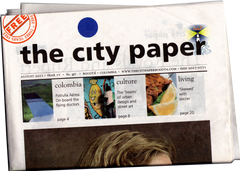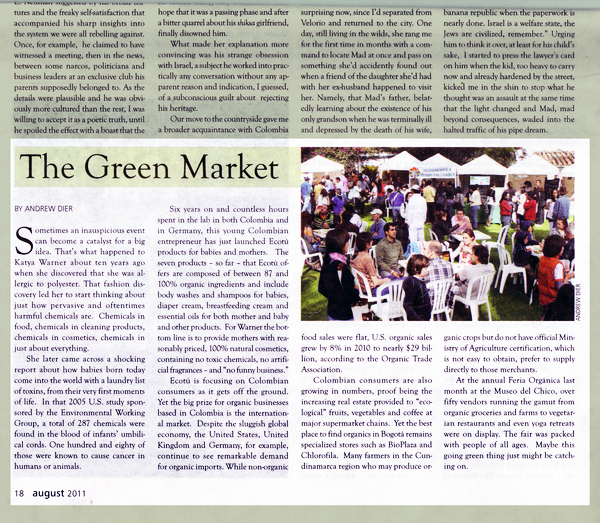 THE GREEN MARKET
THE GREEN MARKET
By Andrew Dier
Sometimes an inauspicious event can become a catalyst for a big idea. That’s what happened to Katya Warner about ten years age when she discovered that she was allergic to polyester. That fashion discovery led her to start thinking about just how pervasive and oftentimes harmful chemicals are. Chemicals in food, chemicals in cleaning products, chemicals in cosmetics, chemicals in just about everything.
She later came across a shocking report about how babies born today come into the world with a laundry list of toxins, from their very first moments of life. In that 2005 U.S. study sponsored by the Environmental Working Group, a total of 287 chemicals were found in the blood of infants’ umbilical cords. One hundred and eighty of those were known to cause cancer in humans or animals.
Six years on and countless hours spent in the lab in both Colombia and in Germany, this young Colombian entrepreneur has just launched Ecotú products for babies and mothers. The seven products – so far – that Ecotú offers are composed of between 87 and 100% organic ingredients and include body washes and shampoos for babies, diaper cream, breastfeeding cream and essential oils for both mother and baby and other products. For Warner the bottom line is to provide mothers with reasonably priced, 100% natural cosmetics, containing no toxic chemicals, no artificial fragrances – and “no funny business.”
Ecotú is focusing on Colombian consumers as it gets off the ground. Yet the big prize for organic businesses based in Colombia is the international market. Despite the sluggish global economy, the United States, United Kingdom and Germany, for example, continue to see remarkable demand for organic imports. While non-organic food sales were flat, U.S. organic sales grew by 8% in 2010 to nearly $29 billion, according to the Organic Trade Association.
Colombian consumers are also growing in numbers, proof being the increasing real estate provided to “ecological” fruits, vegetables and coffee at major supermarket chains. Yet the best place to find organics in Bogotá remains specialized stores such as BioPlaza and Chlorofila. Many farmers in the Cundinamarca region who may produce organic crops but do not have official Ministry of Agriculture certification, which is not easy to obtain, prefer to supply directly to those merchants.
At the annual Feria Orgánica last month at the Museo del Chico, over fifty vendors running the gamut from organic groceries and farms to vegetarian restaurants and even yoga retreats were on display. The fair was packed with people of all ages. Maybe this going green thing just might be catching on.

